The Pope at Congress: Care for Nature and the Poor
Air Date: Week of September 25, 2015
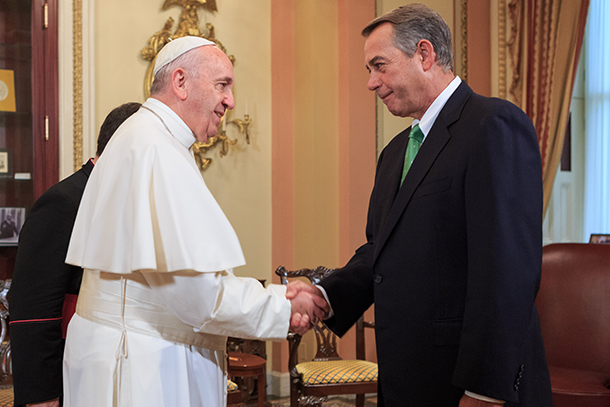
House Speaker John Boehner, a devout Catholic, welcomes Pope Francis before the Holy Father’s speech to a joint session of Congress. (Photo: Speaker John Boehner, Flickr CC BY-NC 2.0)
Pope Francis is the first pontiff to address a joint meeting of Congress. He accompanied forceful words on care for the poor, and the planet with warmth and appreciation for America’s role as a creative and welcoming nation of immigrants.
Transcript
CURWOOD: From the Jennifer and Ted Stanley Studios at the University of Massachusetts Boston and PRI, this is Living on Earth. I’m Steve Curwood.
SERGEANT AT ARMS: Mr Speaker, the Pope of the Holy See.
CURWOOD: Pope Francis has kept a busy schedule on his tour of America. He has celebrated large and even larger Masses, and spoke directly about the urgent need to address climate change to crowds at the White House, and delegates at the United Nations. But he was more measured in his speech to a joint session of Congress, a Congress that has yet to enact any comprehensive climate protection.
POPE FRANCIS: Mr. Vice President, Mr Speaker, honorable members of Congress, dear friends. I am most grateful for the invitation to address this joint session of Congress in the land of the free and home of the brave.
[APPLAUSE]
CURWOOD: His speech was graceful and his words well-chosen, with plenty to please the public as well as the lawmakers, and he urged them to keep in mind the dignity of all human life and the need to protect it. The Pope cited America’s history as he spoke of liberty and dreams, inclusiveness, economic justice and peace. Pope Francis has been critical of the excesses of capitalism, but before Congress he called business “a noble occupation”, especially when it creates jobs and sustainably uses resources for the common good.
POPE FRANCIS: This common good also includes the Earth, a central theme of the encyclical which I recently wrote in order to enter into dialogue with all people about our common home. We need a conversation which includes everyone, since the environmental challenge we are undergoing, and its human roots, concern and affect us all. In Laudato Si, I call for a courageous and responsible effort to redirect our steps, and to avert the most serious effects of the environmental deterioration caused by human activity. I am convinced that we can make a difference. I have no doubt that the United States, and this Congress, have an important role to play. Now is the time for courageous actions and strategies, aimed at implementing a culture of care and an integrated approach to combating poverty, restoring dignity to the excluded, and at the same time protecting nature.
CURWOOD: The chamber was packed. Members of the House, the Senate, the Supreme Court justices, and the cabinet were all there and the applause was often long and loud. We called up Representative Alan Lowenthal, Democrat of California and chair of the Safe Climate Caucus for his reaction.
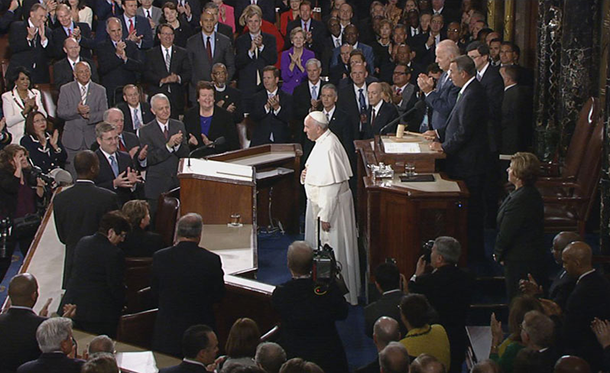
Pope Francis was the first pontiff ever to address a joint session of the United States Congress. (Photo: House Office of Photography)
LOWENTHAL: You know, it really touched on all the aspects that the Pope had written about in the encyclical. One of the things that struck me is the Pope has a way of presenting very controversial issues in a very positive way; what needs to be done, rather than to point his finger and blame, and I think that came through.
CURWOOD: What was the mood in the chamber when the Pope was talking?
LOWENTHAL: You know, the excitement in the place, it was electric in the chambers. It was very interesting when he began to talk about climate change. All the democrats jumped up and supported him, and one or two Republicans did, and then a few more Republicans did and you gradually saw Republicans, at least some of them, beginning to step up and to acknowledge. It was one of the few times where there was a real difference between the response of members of Congress.
CURWOOD: When the Pope spoke in the public session with President Obama, he said that climate change is a problem that can no longer be left to future generations, yet in front of the Congress, he didn't actually mention the words climate change. What you make of that?
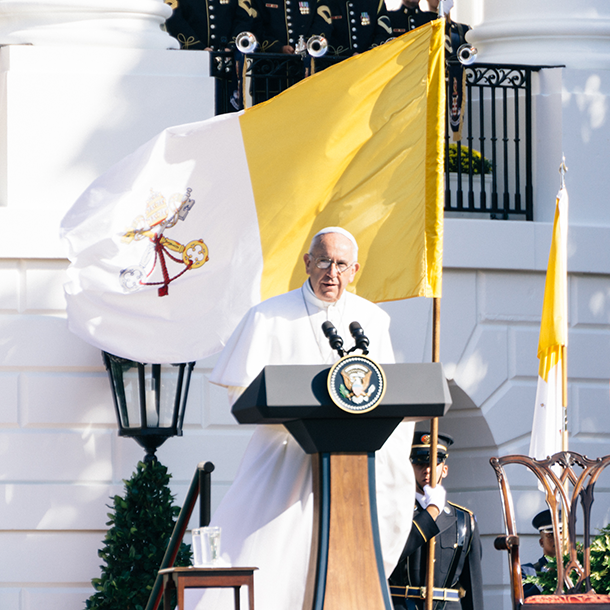
Pope Francis spoke on the White House South Lawn on Wednesday, September 23rd. In that speech, he used the words like “climate change,” in contrast with his address to Congress the following day. (Photo: James Jackson, Flickr CC BY-ND 2.0)
LOWENTHAL: Well I don't make anything of it...I think the most important thing is he called upon Congress to take courageous actions and strategies in implementing what he called a culture of care and I think that's very important, which was an integrated approach to combating poverty, restoring dignity to the excluded. He talked about, at the same time, the need to protect nature and that really we now have to devise, as he pointed out, intelligent ways to limit our power, to put technology in the service of a healthy and more humane and more social and a more integrated approach. He did not directly mention the words “climate change”, but it was really clear that he linked the changes in the planet, that he was saying that those that are most affected or will be are those that are poor, those that have little voice and we have a responsibility here as elected officials to come up with actions and strategies to protect those that are most vulnerable, and not just in terms of inequality, which he did talk about, but also about the impacts of climate.
CURWOOD: So in other words, the Pope is a master politician here, not actually saying “climate change” in front of the Congress when it's safe to say so at the UN or at the White House. Why is that politic, do you think?
LOWENTHAL: Well, I think the Pope's overarching message was it is time to come together to solve these problems. He was interested in identifying the problems but not antagonizing people to such an extent that they would not work together. And I kind of adopted the same techniques on the safe climate caucus. What I did when I took it over; there were 47 members and they were all Democrats, and I've spent a great deal of time reaching out to Republicans, talking about how can we work together on the issues of climate change?
CURWOOD: So how many Republicans do you have?
LOWENTHAL: Well, we waited until the Republicans put out their own resolution talking about climate change, I think under Mr. Gibson and I think there were 10 Republicans and we now would like to sit down with those and others. And I think they've worked very hard at at least identifying 10 Republicans who acknowledge that changing of climate has to do with human activity and I think that's the first time they've ever acknowledged that publicly and put it into a resolution, and I think that's a great first step.
CURWOOD: The Senate side, led by Maria Cantwell, the Democrat from Washington state, has filed a bill on climate that she says obviously won't move unless and until there's a Senate majority after the election, but what you make of this filing and what do you think the Pope's appearance does for the prospects for that kind of legislation?
LOWENTHAL: I believe that it is been since the late 1990s that climate and environmental issues had reached a tipping point of critical importance, and I think that what has happened was that shortly after we began the 21st century it became the 9/11 issue and even though everybody knew, we talked about it, it became less of a important issue. We were dealing with survival, we were dealing with terrorism, we were dealing with the instability throughout the world and climate change dropped off the radar. I think what is occurring and one of the things about the Pope's message is it's part of your call to solving some of the problems of the world whether it’s immigration, whether it's climate change. You cannot separate these problems, and it's time for these to emerge as the major issues before us, and so I think the issue is to reelevate the status of the environmental danger that confronts us.
CURWOOD: That’s Congressman Alan Lowenthal, Democrat of California. For a Republican perspective, we called former Congressman Bob Inglis of South Carolina.
INGLIS: Well, I heard him talk about the spirit of enterprise, which is very exciting because that's what we think can fix climate change.
CURWOOD: In the well of the house, he never used the words carbon, or climate, or ecology. Why do you think that was?
INGLIS: I don't know. I wondered about that. I think that his comments in the encyclical could at least speak for themselves. But I think he was definitely onto something. He was talking about the spirit of enterprise and congratulating America on that. That may have been a way of reaching the crucial constituency for action which is actually conservatives in America and so, by congratulating the spirit of enterprise and maybe applying that to climate change, but not using the words “climate change”, he was doing something very effective, reaching into the hearts and through the hearts and into the minds of fellow conservatives.
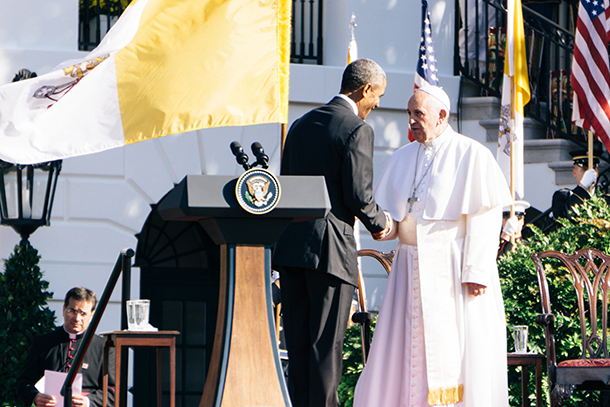
President Obama welcomes Pope Francis to the South Lawn stage. (Photo: James Jackson, Flickr CC BY-ND 2.0)
CURWOOD: Now, famously there have been some Republican candidates for President who have pooh-poohed the Pope speaking out on climate and his big encyclical. Overall how do you think the main body of Republican lawmakers responded to the Pope?
INGLIS: Well, I was very heartened by the speech because I think that he's talking about things of the heart, and when it comes to action on climate change it's mostly a matter of the heart. The head's very clear on climate change, the science is pretty clear, the economics are even clearer that there is a very easy answer which is just: eliminate all the substitutes for all the fuels, attach all the costs to all the fuels and the free enterprise system will sort it out. I think that there is a tendency to minimize the importance of faith. The gospel is much bigger than most of us are thinking and that there really is quite an answer at the cross for the redemption of all of creation, and so limiting that, saying that somehow the Pope isn't qualified to speak on the stewardship of the Earth seems to me a rather strange limitation to place on him.
CURWOOD: The Pope was very strong speaking about the right to life in his address to Congress, a number of ways that he took that message. One was to oppose a death penalty and others to lift people up out of poverty, but clearly another way is the right for our living systems on the planet that support us. What was your take on that?
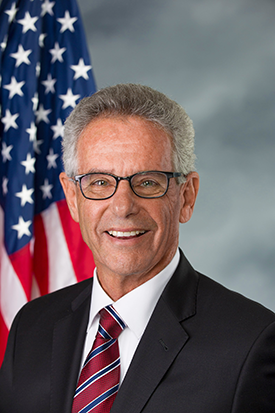
Congressman Alan Lowenthal is the United States Representative for California’s 47th congressional district. (Photo: United States Congress, Wikimedia Commons public domain)
INGLIS: Well, I think he's on solid ground there, that applying that what some may think broadly to creation care is not really that far away from being pro-life. I mean, is it all the same thing? You see, we have to preserve a sustainable system in order to have life on this beautiful planet that we've been given.
CURWOOD: The Pope didn't come out strongly against capitalism in his speech in front of Congress. He did say that there's a right and proper way to use natural resources though. What do you make of that?
INGLIS: I think that the Pope is actually right to question capitalism unrestrained by Judeo-Christian ethic. If it's not restrained, then capitalism is really a pretty lousy system. Communism might be better because at least it starts with the fiction that we're all going to share and share alike. Now, it never works out that way, but the strong message is biblical accountability. Making it so that I can't do on my property something that harms your property and the specific application to climate change, of course, is that currently, fossil fuels are allowed to socialize their soot. It means that if I make electricity from fossil fuels I'm able just to dump into the trash dump of the sky, foul up other people's lungs, foul up their property, and what the Pope seems to me is on solid ground is speaking of that kind of accountability, and if he puts it into the context of creation care that's a fine place to put it, and if he wants to expand that and say that that's protection of life itself, well he’d be correct in that; and it is, in fact, pro-life to talk about sustainability in that way.
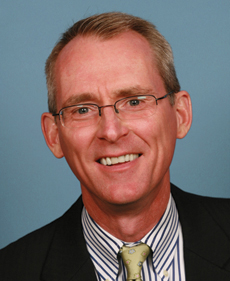
Bob Inglis is a former United States Representative for South Carolina’s 4th congressional district. (Photo: United States Congress, Wikimedia Commons public domain)
CURWOOD: Conservative denominations have been very strong in politics; what influence does this appearance by the Pope have on where things go from here?
INGLIS: This is possibly one of a series of turning points where we expand the constituency for action. Climate change has been a conversation started by the environmental left, it's a conversation that conservatives don't feel so comfortable entering, but when you have a very conservative institution, the Catholic Church, entering the conversation, it brings an opening for conservatives. C,ertainly for conservative Catholics, but also for others of conservative faith to agree with the Pope on many things and the teachings of the church on many things. So it could be a game changer in that it's adding new people to the conversation.
CURWOOD: Former Republican Congressman Bob Inglis of South Carolina. Just ahead...fighting to save the Cypress swamps of Louisiana. Stay tuned to Living on Earth.
Links
Pope Francis Skirts Environmental Tussles in Address to Congress
The transcript of Pope Francis’s speech to Congress
A complete schedule of the Pope’s visit to the U.S.
U.S. Congressman Alan Lowenthal
A previous Living on Earth conversation with Bob Inglis
Bob Inglis is Executive Director of the Energy and Enterprise Initiative
Living on Earth wants to hear from you!
Living on Earth
62 Calef Highway, Suite 212
Lee, NH 03861
Telephone: 617-287-4121
E-mail: comments@loe.org
Newsletter [Click here]
Donate to Living on Earth!
Living on Earth is an independent media program and relies entirely on contributions from listeners and institutions supporting public service. Please donate now to preserve an independent environmental voice.
NewsletterLiving on Earth offers a weekly delivery of the show's rundown to your mailbox. Sign up for our newsletter today!
 Sailors For The Sea: Be the change you want to sea.
Sailors For The Sea: Be the change you want to sea.
 The Grantham Foundation for the Protection of the Environment: Committed to protecting and improving the health of the global environment.
The Grantham Foundation for the Protection of the Environment: Committed to protecting and improving the health of the global environment.
 Contribute to Living on Earth and receive, as our gift to you, an archival print of one of Mark Seth Lender's extraordinary wildlife photographs. Follow the link to see Mark's current collection of photographs.
Contribute to Living on Earth and receive, as our gift to you, an archival print of one of Mark Seth Lender's extraordinary wildlife photographs. Follow the link to see Mark's current collection of photographs.
 Buy a signed copy of Mark Seth Lender's book Smeagull the Seagull & support Living on Earth
Buy a signed copy of Mark Seth Lender's book Smeagull the Seagull & support Living on Earth

